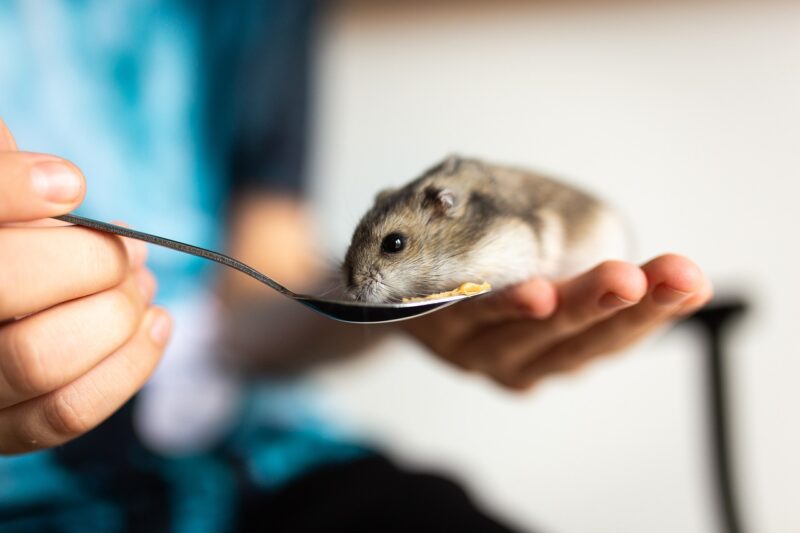The Lifespan of Hamsters: What You Need to Know About Caring for Your Small Pet
November 13, 2024

Hamsters are undoubtedly one of the most popular pets worldwide, cherished for their adorable appearance and entertaining behavior. They make great companions, particularly for children and first-time pet owners. However, understanding the lifespan of hamsters and how to care for them is crucial to ensure these little creatures live happy and healthy lives.
1. The Average Lifespan of Hamsters
The average lifespan of a hamster varies based on its species, but most live between 2 to 3 years. Here’s a brief overview of different hamster species and their expected lifespans:
- Syrian Hamsters: These are the largest and most commonly kept hamsters, with an average lifespan of 2 to 3 years. With proper care, some may live up to 4 years.
- Dwarf Hamsters: These include Campbell’s dwarf, Roborovski, and Chinese hamsters. Typically, their lifespan ranges from 1.5 to 3 years, depending on the species.
- Winter White Hamsters: This species generally lives around 2 to 3 years, sometimes reaching up to 4 years with excellent care.
Understanding these lifespan averages will help you prepare for your hamster’s care and well-being throughout its life.
2. Factors Influencing Hamster Lifespan
Several factors can influence how long your hamster lives, including:
- Genetics: Like all pets, genetics play a significant role in a hamster’s lifespan. Certain breeds may have predispositions to certain health conditions.
- Diet: A balanced and nutritious diet is essential. Feeding your hamster high-quality pellets and fresh vegetables can promote optimal health.
- Environment: Hamsters require a clean, spacious, and secure habitat. A well-kept cage reduces stress and illness, which can lead to a longer life.
- Health Care: Regular veterinary check-ups can help identify and treat any potential health issues early, extending your hamster’s lifespan.
- Activity Level: A hamster that leads an active lifestyle can be healthier and more robust. Providing plenty of exercise through tunnels, wheels, and safe toys is crucial.
Each of these factors plays a vital role in ensuring your furry friend lives a full, happy life.
3. Providing the Best Care for Your Hamster
To promote a long and healthy life for your hamster, consider the following care tips:
- Cage Setup: Provide a roomy cage with proper bedding, hiding spots, and toys. Ensure it is well-ventilated and cleaned regularly to prevent odor and disease.
- Healthy Diet: Hamsters thrive on a mix of high-quality hamster pellets, fresh fruits, and vegetables. Avoid sugary or fatty foods to prevent obesity and related health issues.
- Access to Fresh Water: Provide clean water at all times, and change it daily to keep your pet hydrated and healthy.
- Regular Exercise: Hamsters are naturally active creatures, so providing exercise wheels, tunnels, and chew toys is essential for their physical and mental well-being.
- Social Interaction: Spend time with your hamster daily to create a bond. Some hamsters enjoy being held or let out for supervised explorations.
Implementing these care routines ensures your hamster remains active, healthy, and happy throughout its life!
4. Recognizing Health Issues in Hamsters
Even with the best care, hamsters can face health challenges. Here’s how to spot potential problems:
- Behavior Changes: If your hamster becomes lethargic, refuses to eat, or shows other unusual signs, it may be a health concern that requires a vet’s attention.
- Physical Symptoms: Look for signs such as hair loss, ulcers, diarrhea, or excessive sneezing, which may indicate underlying issues requiring veterinary care.
- Dental Problems: Check for overgrown teeth or difficulty eating, as hamsters’ teeth continuously grow and can cause serious health issues if they become misaligned.
Promptly address any health-related concerns with a veterinarian who specializes in small animals to increase the chances of a successful outcome.
5. Conclusion: Ensuring a Happy Life for Your Hamster
Understanding the lifespan of hamsters and their care needs is essential for every hamster owner. With an average lifespan of 2 to 3 years, it’s critical to provide a nurturing, stable environment with proper nutrition, regular exercise, and plenty of social interaction.
Taking proactive steps in your hamster’s care not only enhances their quality of life but can extend their lifespan, allowing you to create lasting memories with your beloved pet.
Use this guide to ensure your hamster lives a fulfilling life full of happiness and good health. Whether you are a new hamster owner or a seasoned enthusiast, the joy these little pets bring into our lives is immeasurable, and your commitment to their well-being will make all the difference.






